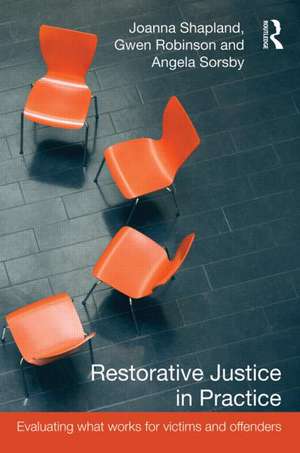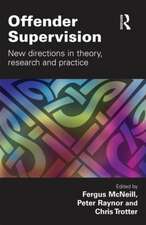Restorative Justice in Practice: Evaluating What Works for Victims and Offenders
Autor Joanna Shapland, Gwen Robinson, Angela Sorsbyen Limba Engleză Paperback – 4 mai 2011
Restorative Justice in Practice addresses this need, analyzing the results of the implementation of three restorative justice schemes in England and Wales in the largest and most complete trial of restorative justice with adult offenders worldwide. It aims to bring out the practicalities of setting up and running restorative justice schemes in connection with criminal justice, the costs of doing so and the key professional and ethical issues involved.
At the same time the book situates these findings within the growing international academic and policy debates about restorative justice, addressing a number of key issues for criminal justice and penology, including:
- how far victim expectations of justice are and can be met by restorative justice aligned with criminal justice
- whether ‘community’ is involved in restorative justice for adult offenders and how this relates to social capital
- how far restorative justice events relate to processes of desistance (giving up crime), promote reductions in reoffending and link to resettlement
- what stages of criminal justice may be most suitable for restorative justice and how this relates to victim and offender needs
- the usefulness of conferencing and mediation as forms of restorative justice with adults.
| Toate formatele și edițiile | Preț | Express |
|---|---|---|
| Paperback (1) | 482.08 lei 43-57 zile | |
| Taylor & Francis – 4 mai 2011 | 482.08 lei 43-57 zile | |
| Hardback (1) | 1107.34 lei 43-57 zile | |
| Taylor & Francis – 4 mai 2011 | 1107.34 lei 43-57 zile |
Preț: 482.08 lei
Nou
Puncte Express: 723
Preț estimativ în valută:
92.24€ • 96.57$ • 76.33£
92.24€ • 96.57$ • 76.33£
Carte tipărită la comandă
Livrare economică 07-21 aprilie
Preluare comenzi: 021 569.72.76
Specificații
ISBN-13: 9781843928454
ISBN-10: 1843928450
Pagini: 240
Ilustrații: 1 black & white illustrations, 6 black & white tables, 1 black & white line drawings
Dimensiuni: 156 x 234 x 15 mm
Greutate: 0.44 kg
Ediția:New.
Editura: Taylor & Francis
Colecția Willan
Locul publicării:Oxford, United Kingdom
ISBN-10: 1843928450
Pagini: 240
Ilustrații: 1 black & white illustrations, 6 black & white tables, 1 black & white line drawings
Dimensiuni: 156 x 234 x 15 mm
Greutate: 0.44 kg
Ediția:New.
Editura: Taylor & Francis
Colecția Willan
Locul publicării:Oxford, United Kingdom
Cuprins
1. Setting the Scene 2. Setting the Schemes in Context: A Review of the Aims, Histories and Results of Restorative Justice 3. Setting Up and Running Restorative Justice Schemes 4. Accountability, Regulation and Risk Experiencing Restorative Justice 5. Approaching Restorative Justice 6. Through a Different Lens: Examining Restorative Justice Using Case Studies 7. During Restorative Justice Events Looking Back at Restorative Justice: What Do People Think it Achieved? 8. The Victims’ View: Satisfaction and Closure 9. Outcome Agreements and their Progress 10. The Offenders’ View: Reoffending and the Road to Desistance 11. Restorative Justice: Lessons from Practice
Notă biografică
Joanna Shapland is Professor of Criminal Justice in the School of Law, University of Sheffield, and Head of the School of Law; Gwen Robinson is Senior Lecturer in Criminal Justice in the School of Law at the University of Sheffield; Angela Sorsby is a freelance criminologist specialising in data analysis and statistics.
Recenzii
"This seven year study is the most important research evidence on restorative justice (RJ) in this country. The work challenges some of the myths around restorative justice – for example the finding that 70% of victims of serious crimes chose to meet the offender when this was offered to them, challenges the prevailing view that RJ is only appropriate for less serious crime. Her research has confirmed earlier findings of the strong victim benefits from restorative justice; and provided new evidence for the impact of RJ in reducing re-offending, leading to cost-savings across Criminal Justice. This book will provide essential reading for policy makers interested in evidence-based policy; for criminal justice agencies seeking to give victims a stronger voice in justice; and includes a wealth of information for practitioners who want to know 'what works' and base their restorative practice on the evidence." – Lizzie Nelson, Director, Restorative Justice Council
'This book provides a state-of-the-art analysis of restorative justice, conferences, and mediation for serious cases and adult offenders. It is essential reading for policymakers and practitioners who wish to develop restorative justice schemes that work alongside conventional criminal justice. Its comprehensive and measured analysis is a welcome addition to the research literature. This is a scholarly treatment of restorative justice for the real world and ways to move it from the margins to the mainstream of criminal justice.' – Kathleen Daly, Professor of Criminology and Criminal Justice, Griffith University, Australia
'The authors promised to provide "essential reading" for students and practioners. They have met that promise in regard to both their description of applications of RJ in the adult justice system (pre-trial, during sentencing formulation, and post sentencing) and in their many probing questions regarding RJ in general.'
-Eric Assur, in the Restorative Justice Online blog, 2 March 2012
'This book provides a state-of-the-art analysis of restorative justice, conferences, and mediation for serious cases and adult offenders. It is essential reading for policymakers and practitioners who wish to develop restorative justice schemes that work alongside conventional criminal justice. Its comprehensive and measured analysis is a welcome addition to the research literature. This is a scholarly treatment of restorative justice for the real world and ways to move it from the margins to the mainstream of criminal justice.' – Kathleen Daly, Professor of Criminology and Criminal Justice, Griffith University, Australia
'The authors promised to provide "essential reading" for students and practioners. They have met that promise in regard to both their description of applications of RJ in the adult justice system (pre-trial, during sentencing formulation, and post sentencing) and in their many probing questions regarding RJ in general.'
-Eric Assur, in the Restorative Justice Online blog, 2 March 2012
Descriere
This book analyzes the practicalities of setting up and running restorative justice schemes, the costs involved and the key professional and ethical issues involved such as victims' and offenders' needs and expectations, community and desistance.











